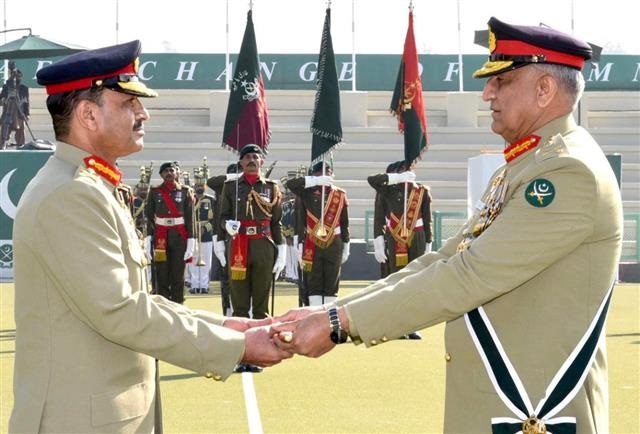Political uncertainty in Pakistan

Outgoing Chief of Army Staff General Qamar Javed Bajwa hands over the baton of command over to the newly appointed Army Chief General Asim Munir (L), during a ceremony at the army headquarters in Rawalpindi, on November 29, 2022. ISPR/Handout via Reuters
Dr. Shalini Chawla
In recent months, Pakistan has been witnessing significant political instability, an alarming economic crisis, and efforts from the political leadership to revive its slanted relationship with the West. This periodic political instability is not new in Pakistan, and historical evidence suggests the consistent inability of the democratic leaders in Pakistan to sustain power strings for their designated tenure. The political cycle as suggested by the historical evidence is that a democratic leader receives complete support from the military establishment and comes into power promising betterment of the Pakistani awaam, but the civil-military bonhomie typically fails to last beyond 2-3 years. After coming into power, the political leadership starts asserting itself in the domains that have remained sacrosanct to the establishment, challenging the authority of the military, leading to strains in the relationship and eventually the exit of the elected leader, who invariably faces corruption charges and lands behind bars, before the military starts to back another leader of their choice. Imran Khan’s victory in the 2018 general elections and his subsequent departure in the no-confidence vote were no deviation from the past trends.
Even though the political instability has been cyclic in Pakistan, what has been different in Khan’s case is that he managed to build a support lobby for himself within the critical institutions in Pakistan, which have backed his actions and narratives against the establishment. Post his ouster, Imran Khan has been on a rallying spree and has gathered support on primarily three narratives: the anti-corruption narrative, where he has pointed fingers at the opposition party leaders for their corrupt records, the anti-US narrative, where he held the US responsible for conspiring his exit; and the anti-military narrative, where he has accused the establishment (few senior army officers) of being ‘traitor’ and corrupt. His mass following and support, which reflected in his victory in the recent by-elections, indicate that his narratives have apparently been in sync with the popular sentiments.
Khan’s support within the country has been a challenge for the Shehbaz Sharif government and the military establishment. The military’s image has suffered a serious blow in a military-run state as a result of the blatant accusations by Imran Khan, which he started to levy after realizing that the establishment is no longer willing to back him. In fact, the last time the nation saw a decline in the military’s respect and image (to this extent) was after the killing of Osama bin Laden, almost next door to Pakistan’s Kakul Military Academy, in 2011 during General Kayani’s tenure.
The newly appointed Chief of Army Staff, General Asim Munir, has some daunting tasks ahead of him. For sure, he needs to revive the army’s position and respect within society. This has been a critical factor in the functioning of the state, where the national objectives, domestic policies, ideological affiliations, and, very importantly, alliances with major powers, have been dominated by the military’s thinking and choices. The appointment of the army chief has been probably one of the most significant issues on Imran Khan’s agenda, and his efforts starting April this year have been to pressurise the regime, with the consistent display of his street power, to hold early elections. Also, Khan recently announced that his party will ‘not remain part of the current political system’. While the coming weeks and months will unfold some interesting political dynamics in Pakistan, Imran Khan cannot afford to antagonise the establishment anymore. Khan’s past ‘unpleasant record’ with Gen Munir has been a major contributor to Sharif’s calculated selection of the chief. The new chief will be focused on restoring the public’s perception of the establishment, working towards political stability (without getting overtly engaged), focusing on economic management, and continuing the momentum of the revival of Pakistan’s foreign relations.
The writer is a distinguished fellow, Centre for Air Power Studies, New Delhi
